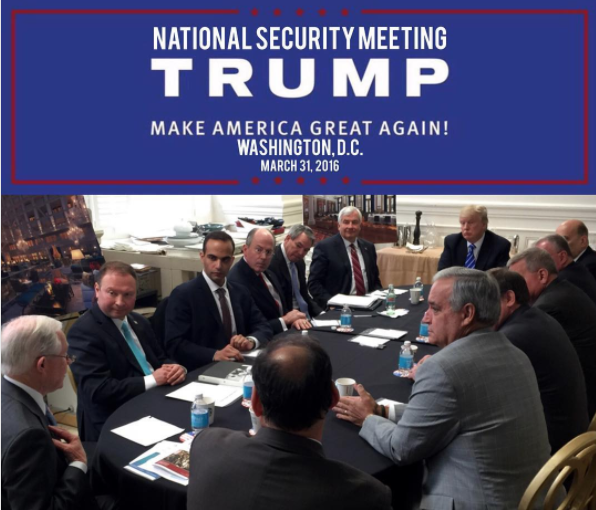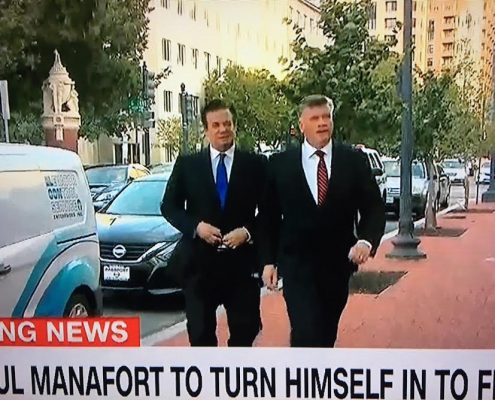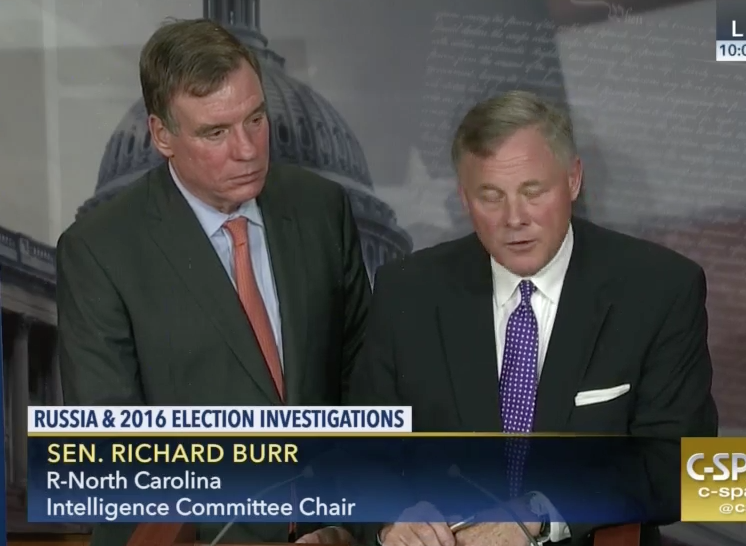Let me start this post by reposting in full my explanation of why Trump opponents are idiots for clinging to the Steele dossier, so I can add to that with an explanation of why the disclosure that Marc Elias paid for the dossier on behalf of Hillary and the DNC makes it far, far worse.
I have zero doubt that the Russians attempted to influence the election. I think it likely Robert Mueller will eventually show evidence that senior people in Trump’s camp attempted to and may have coordinated with people working for Russia, and people more tangential to the campaign sought out Russians for help. I think if the full story of the Russian involvement in the election comes out, it will be worse than what people currently imagine.
I also think Trump opponents have made a really grave error in investing so much in the Steele dossier. That’s true because, from the start, there were some real provenance questions about it, as leaked. Those questions have only grown, as I’ll explain below. The dossier was always way behind ongoing reporting on the hack-and-leak, meaning it is utterly useless for one of the most important parts of last year’s tampering. The dossier provides Trump officials a really easy way to rebut claims of involvement, even when (such as with Michael Cohen) there is ample other evidence to suggest inappropriate ties with Russia. Most importantly, the dossier is not needed for the most common reason people cling to it, to provide a framework to understand Trump’s compromise by Russia. By late January, WaPo’s reporting did a far better job of that, with the advantage that it generally proceeded from events with more public demonstrable proof. And (again, given the abundance of other evidence) there’s no reason to believe the Mueller investigation depends on it.
But because Trump opponents have clung to the damn dossier for months, like a baby’s blanket, hoping for a pee tape, it allows Trump, Republicans, and Russians to engage in lawfare and other means to discredit the dossier as if discrediting the dossier will make the pile of other incriminating evidence disappear.
So let’s see how the Marc Elias disclosure makes this far, far worse.
The WaPo reports that Elias’ firm, Perkins Coie, acting on behalf of both Hillary and the DNC, paid Fusion GPS. And they did so much earlier than previously reported, starting in April.
Marc E. Elias, a lawyer representing the Clinton campaign and the DNC, retained Fusion GPS, a Washington firm, to conduct the research.
After that, Fusion GPS hired dossier author Christopher Steele, a former British intelligence officer with ties to the FBI and the U.S. intelligence community, according to those people, who spoke on the condition of anonymity.
Elias and his law firm, Perkins Coie, retained the company in April 2016 on behalf of the Clinton campaign and the DNC. Before that agreement, Fusion GPS’s research into Trump was funded by an unknown Republican client during the GOP primary.
Given the numbering of the dossier, the April date makes far better sense than the June date. In fact, on January 13, I said, “It must have started sometime in April.” Yay me — that’s the one piece of prescience I’ll write about here I’m happy about.
The news comes as Fusion has been digging itself deeper and deeper into a perjury hole in an effort to protect Elias and the Democrats, just as they would have had to release financial documents showing Perkins Coie’s involvement in any case (I’ll do a follow-up to show that Fusion seems to have been using a cute definition of “client” in its sworn legal declarations about the dossier).
Some of the details are included in a Tuesday letter sent by Perkins Coie to a lawyer representing Fusion GPS, telling the research firm that it was released from a client-confidentiality obligation. The letter was prompted by a legal fight over a subpoena for Fusion GPS’s bank records.
As the WaPo and an army of Dem flacks have noted since this story broke, it is totally normal to pay oppo research firms for dirt on opponents.
It is!!
Which ought to raise really big questions why Elias didn’t come forward before now to simply admit that Hillary and the Dems — rather than some unnamed big donor as has always been intimated — were doing what every campaign normally does.
And there are several likely reasons for that.
First, consider what position this puts the FBI in. Steele started sharing his information with the FBI during the summer, possibly before the FBI opened an investigation into Trump’s Russian ties (though the CIA claims to have had a report in June about such ties, so the investigation doesn’t derive exclusively from the dossier). It’s still unclear — not even given Steele’s legal statements on this fact — whether Steele shared the information on his own, or whether Fusion permitted him to share. It’s also not clear whether Steele disclosed to FBI who was paying for his work (or even if he actually knew). But it is qualitatively different for the FBI to accept and respond to information from a political party than it is to respond to information paid for by — say — a rich private person like George Soros. That is, admittedly, how the Whitewater investigation got started (so I can appreciate the irony), but it was wrong then and it’s wrong now.
Note, this detail also provides a much better explanation for why the FBI backed out of its planned relationship with Steele in October, one that matches my supposition. As soon as it became clear Elias was leaking the dossier all over as oppo research, the FBI realized how inappropriate it was to use the information themselves, no matter how credible Steele is. This also likely explains why FBI seeded a story with NYT, one Democrats have complained about incessantly since, reporting “none of the investigations so far have found any conclusive or direct link between Mr. Trump and the Russian government.” Ham-handed? Sure. But in the wake of Harry Reid and David Corn’s attempts to force FBI to reveal what Democratic oppo research had handed to FBI, the FBI needed to distance themselves from the oppo research, and make sure they didn’t become part of it. Particularly if Steele was not fully forthcoming about who was paying him, the FBI was fucked.
And consider what Hillary and the DNC did. Back when the June 9 Trump Tower meeting first broke, I warned Democrats who were screaming that this was proof of collusion to be very careful of how they defined it.
[T]hus far, it is not evidence of collusion, contrary to what a lot of people are saying.
That’s true, most obviously, because we only have the implicit offer of a quid pro quo: dirt on Hillary — the source of which is unknown — in exchange for sanctions relief. We don’t (yet) have evidence that Don Jr and his co-conspirators acted on that quid pro quo.
But it’s also true because if that’s the standard for collusion, then Hillary’s campaign is in trouble for doing the same.
Remember: A supporter of Hillary Clinton paid an opposition research firm, Fusion GPS, to hire a British spy who in turn paid money to Russians — including people even closer to the Kremlin than Veselnitskaya — for Russia-related dirt on Don Jr’s dad.
Yes, the Clinton campaign was full of adults, and so kept their Russian-paying oppo research far better removed from the key players on the campaign than Trump’s campaign, which was run by incompetents. But if obtaining dirt from Russians — even paying Russians to obtain dirt — is collusion, then a whole bunch of people colluded with Russians (and a bunch of other foreign entities, I’m sure), including whatever Republican originally paid Fusion for dirt on Trump.
Breaking: Our political process is sleazy as fuck (but then, so are most of our politicians).
I assumed at the time that Democrats were adults and provided Hillary some plausible deniability and distance from the payments to ex-spooks who in turn paid Russian spies.
Serves me right for underestimating, yet again, Hillary’s ability to score own goals, because Nope! They’re not that adult! And so while it pains me greatly to have to say this, the Dems who screamed “COLLUSION!!!!!!!!” after evidence of a meeting but not payment have earned this attack from Ari Fleischer, accusing them of colluding, because that’s the standard they adopted at the time.
Finally, there’s the most interesting thing implicated by the disclosure that Perkins Coie partner Marc Elias paid for the dossier.
As noted, the WaPo explains Elias started to do so in April, which makes far more sense given the numbering of the dossier. But Steele, we know, was brought in in June; his first report, about whether Russia had kompromat on Hillary, was June 20. That means Steele’s involvement, paid for by Perkins Coie, postdates the involvement of Perkins Coie partner (and former DOJ prosecutor who should have known better than to do this) Michael Sussman in the DNC’s response to learning they were hacked by Russia, starting around April 29.
“Not sure it is related to what the F.B.I. has been noticing,” said one internal D.N.C. email sent on April 29. “The D.N.C. may have been hacked in a serious way this week, with password theft, etc.”
No one knew just how bad the breach was — but it was clear that a lot more than a single filing cabinet worth of materials might have been taken. A secret committee was immediately created, including Ms. Dacey, Ms. Wasserman Schultz, Mr. Brown and Michael Sussmann, a former cybercrimes prosecutor at the Department of Justice who now works at Perkins Coie, the Washington law firm that handles D.N.C. political matters.
“Three most important questions,” Mr. Sussmann wrote to his clients the night the break-in was confirmed. “1) What data was accessed? 2) How was it done? 3) How do we stop it?”
It also means that Steele’s involvement — paid for by Perkins Coie — roughly coincides with the time Democrats and Perkins Coie partner Michael Sussman first sat down with the FBI and pushed the FBI to “tell the American public that” Russia had attacked the Democrats.
The D.N.C. executives and their lawyer had their first formal meeting with senior F.B.I. officials in mid-June, nine months after the bureau’s first call to the tech-support contractor. Among the early requests at that meeting, according to participants: that the federal government make a quick “attribution” formally blaming actors with ties to Russian government for the attack to make clear that it was not routine hacking but foreign espionage.
“You have a presidential election underway here and you know that the Russians have hacked into the D.N.C.,” Mr. Sussmann said, recalling the message to the F.B.I. “We need to tell the American public that. And soon.”
Shortly thereafter, Steele, paid for by Perkins Coie, started sharing reports with the FBI, with as yet unknown disclosure to them about who was paying his bills. Do you see why this is a problem yet?
Note, too, the irony. The DNC was unwilling to share their server directly with the FBI. But they were willing to launder their intelligence to it.
Not cool, Democrats. Also, not smart.
Now, add to this massive own goal the Democrats have scored on themselves. The second report in the released dossier, is dated July 26, released four days after WikiLeaks started releasing the DNC emails, making it clear the Democrats had a far bigger hack-and-leak problem on their hands than they had let on in a June 14 story to the WaPo. It is an incredibly back-assward report on Russian hacking that proved unaware of the most basic publicly known details about Russia’s hacking (the Democrats would have been better served reading this report that had been released ten months before, which is almost certainly what FBI was trying to point them to when they first warned of the hack in September). That is, in the wake of the DNC hack, the Democrats’ lawyer paid for private intelligence about Russian involvement with Trump, and they ended up paying someone whose sources (because Steele is a follow-the-money guy, not a follow-the-packets guy) consistently were months and months behind the public knowledge on the hack.
Yikes.
Finally, one more point. It has been clear for some time that Steele’s reports had some kind of feedback loop, responding to information the Democrats got. That was most obvious with respect to the September 14 Alfa Bank report, which was obviously written after first news of the Alfa Bank/Trump Tower story, which was pushed by Democratic partisans. Particularly given that we know the released report is a selective release of just some reports from the dossier, the inclusion of Alfa Bank in that release makes no sense. Even if reports about old corrupt ties between Alfa and Putin are true (as if Democratic politicians and corrupt American banks never have old ties), the inclusion of the Alfa report in the dossier on Trump made zero sense.
Which is why Alfa Bank decided — after consulting with big Republican lawyers like Viet Dinh and soon-to-be DOJ Criminal Division Chief Brian Benczkowski — to sue for defamation. Now I understand why (particularly given that Republicans seem to have known who paid for the dossier for some time). I’m not sure Alfa Bank executives pass the bar for defamation here (though the publication of a report that misspelled Alfa’s name is pretty damning), but the fact that Elias paid for this dossier on behalf of the Democrats is going to make that defamation case far more explosive (and I’ll be surprised if Elias doesn’t get added into the mix).
As I said when I began this: I have no doubt Russia tampered with the election, and if the full truth comes out I think it will be more damning than people now imagine.
But the Democrats have really really really fucked things up with their failures to maintain better ethical distance between the candidate and the dossier, and between the party and the FBI sharing. They’ve made things worse by waiting so long to reveal this, rather that pitching it as normal sleazy political oppo research a year ago.
The case of Russian preference for Trump is solid. The evidence his top aides were happy to serve as Russian agents is strong.
But rather than let FBI make the case for that, Democrats instead tried to make their own case, and they did in such a way as to make the very solid case against Trump dependent on their defense of the dosser, rather than on better backed claims released since then.
Boy it seems sadly familiar, Democrats committing own goals like this. And all that’s before where the lawfare on this dossier is going to go.
Update, 12/6/17: This, from April, is a really interesting claim by claim debunking of the dossier.







